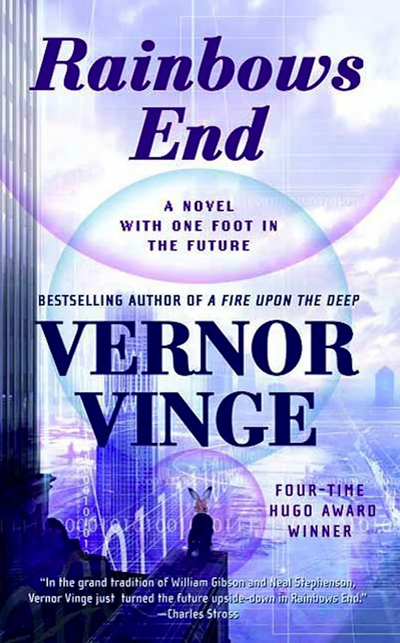Glenn Reynolds remember science fiction author Vernor Vinge, who died last week aged 79, reportedly from complications of Parkinson’s Disease:
Vernor Vinge has died, but even in his absence, the rest of us are living in his world. In particular, we’re living in a world that looks increasingly like the 2025 of his 2007 novel Rainbows End. For better or for worse.
[…]
Vinge is best known for coining the now-commonplace term “the singularity” to describe the epochal technological change that we’re in the middle of now. The thing about a singularity is that it’s not just a change in degree, but a change in kind. As he explained it, if you traveled back in time to explain modern technology to, say, Mark Twain – a technophile of the late 19th Century – he would have been able to basically understand it. He might have doubted some of what you told him, and he might have had trouble grasping the significance of some of it, but basically, he would have understood the outlines.
But a post-singularity world would be as incomprehensible to us as our modern world is to a flatworm. When you have artificial intelligence (and/or augmented human intelligence, which at some point may merge) of sufficient power, it’s not just smarter than contemporary humans. It’s smart to a degree, and in ways, that contemporary humans simply can’t get their minds around.
I said that we’re living in Vinge’s world even without him, and Rainbows End is the illustration. Rainbows End is set in 2025, a time when technology is developing increasingly fast, and the first glimmers of artificial intelligence are beginning to appear – some not so obviously.
Well, that’s where we are. The book opens with the spread of a new epidemic being first noticed not by officials but by hobbyists who aggregate and analyze publicly available data. We, of course, have just come off a pandemic in which hobbyists and amateurs have in many respects outperformed public health officialdom (which sadly turns out to have been a genuinely low bar to clear). Likewise, today we see people using networks of iPhones (with their built in accelerometers) to predict and observe earthquakes.
But the most troubling passage in Rainbows End is this one:
Every year, the civilized world grew and the reach of lawlessness and poverty shrank. Many people thought that the world was becoming a safer place … Nowadays Grand Terror technology was so cheap that cults and criminal gangs could acquire it. … In all innocence, the marvelous creativity of humankind continued to generate unintended consequences. There were a dozen research trends that could ultimately put world-killer weapons in the hands of anyone having a bad hair day.
Modern gene-editing techniques make it increasingly easy to create deadly pathogens, and that’s just one of the places where distributed technology is moving us toward this prediction.
But the big item in the book is the appearance of artificial intelligence, and how that appearance is not as obvious or clear as you might have thought it would be in 2005. That’s kind of where we are now. Large Language Models can certainly seem intelligent, and are increasingly good enough to pass a Turing Test with naïve readers, though those who have read a lot of Chat GPT’s output learn to spot it pretty well. (Expect that to change soon, though).




